- Home
- Linda Lael Miller
Knights Page 21
Knights Read online
Page 21
“Hello, Gloriana,” he said gently.
“H-hello,” Gloriana responded, somewhat breathlessly. If only there were a device that would allow her to hear Dane speak, as she was hearing Lyn.
“Is my sister treating you well?”
Gloriana nodded, then remembered herself and said. “Yes. Janet is very kind—like you.” It was a little unnerving, speaking to someone she couldn’t see—rather like carrying on a conversation with a ghost.
Lyn assured her that she could ring him whenever she wanted and gave her the number. After that, she surrendered the receiver to Janet again and went to the window to look out.
She was among friends, she knew that. And yet the need to see Dane, to touch him and hear his voice, was an all-pervasive ache. Would she never find her way back to him? Must she resign herself to spending the rest of her life in the latter part of the twentieth century, where she simply did not belong?
The rain continued through the afternoon, the perfect backdrop for Gloriana’s solemn mood. Sorrow notwithstanding, she paid attention while Janet showed her the basics of running the shop—answering the telephone, when to lock up and when to open for business, how to summon help in case of emergency. Gloriana was amazed that Janet was willing to trust her, a virtual stranger, with so much responsibility. The shop was full of precious things.
“When in doubt,” Janet summarized, much later, when the two women were seated near the shop’s little stove, sipping tea, “just turn the lock, pull the blinds, and take yourself out for a walk or upstairs to watch the telly. It’s mostly a matter of convenience to my customers, my keeping the place open. Some of them get very edgy if I’m away and they’ve developed a penchant for some dusty old tome—they hate to wait, poor dears.”
“What if I make a mistake?” Gloriana ventured quietly. At Hadleigh Castle, before Dane’s return from the Continent, she had been learning to monitor the household accounts, and she had always followed the investment of her personal fortune. The things Janet had shown her, though quite complicated, made sense.
Janet shrugged. “Everyone does, at one time or another. If anything concerning a transaction troubles you, simply ask the client to wait until I come home.”
After that, the subject of business was closed. Gloriana retired to her room, bathed, and went to bed early. She had declined supper and immediately tumbled into a dream so vivid that for a few breathless moments she actually thought she had returned to Kenbrook Hall, and to Dane.
It seemed she stood in the tower room, beside the bed she had shared with her husband. He lay sleeping, the covers tangled at his waist from much tossing and turning, his fair hair glimmering in the feeble flicker of an oil lamp’s wick.
Gloriana whispered his name as she touched his forehead with the lightest brush of her fingertips. He stirred and murmured something, and she bent over him, realizing by then that she was only dreaming, that in truth they were as far apart as ever. She kissed his mouth, and her tears fell, shimmering, upon his face.
He opened his eyes. “Gloriana,” he said, on a ragged breath. “Thank God—”
She felt herself begin to fade and reached for him, but it was too late. She awakened, face wet, heart breaking, in the spare room of Janet’s flat. Dane was as far from her as ever, and yet she sensed that he was near too. The special wind-and-rain scent of him was in her nostrils, and the texture and warmth of his lips were etched into her own.
Gloriana lay back on her pillows, making no effort to wipe away her tears or to stem their flow. As she mourned, she also wondered. Had she dreamed of Dane or, for however few precious moments, had she actually visited him?
Dane lay trembling upon his bed, the room dark except for the dying light of the single lamp he had left burning on a nearby table. He had seen her, had seen Gloriana. She had touched her mouth to his, in the sweetest and briefest of kisses, and he’d seen the love glowing in her beautiful eyes as she looked at him.
A dream? No. Dane had no doubt that she’d been real. Somehow, for the merest fraction of a moment, Gloriana had managed to slip through the veil of time and mystery that separated them. While he was despondent that she was once more lost to him, he was also encouraged. By the grace of God, or some benevolent angel, he would find her again.
He rose, went to the window, and stared out at the moonlight shimmering on the waters of the lake. Had Gloriana been kidnapped or simply gotten lost, he would have been able to bring her home, even if it meant battling every brigand in England, searching every loft and hidden glen. Instead, she had stepped over some mystic threshold, and he did not know how to follow.
The morning after her dream-visit to Dane, Gloriana awakened with a bruised heart, an aching head, and puffy eyes. She splashed her face with cold water in the little bathroom, brushed her hair and teeth, and put on slacks, a sweater, and loafers.
Janet was having tea and toasted bread in the kitchen area when Gloriana joined her.
“Good heavens,” Janet said with spirit, rising from her chair and hurrying over to Gloriana, “you look as though you’ve wept the night away. Are you ill? Shall I ring Lyn?”
Gloriana shook her head, trying to smile because she wanted to reassure her worried friend. “No,” she said quickly, miserably. “Don’t bother him, please. I’m just—missing someone.”
Janet gestured an invitation for Gloriana to sit down at the table, and she did so. Soon, there was a cup of tea steaming in front of her. With a hand that trembled slightly, she added sugar and milk.
“A lost love, is it?” Janet pursued the subject cautiously, taking her own seat again and spreading marmalade onto a slice of bread.
Gloriana nodded and forced herself to follow suit. She must eat, if she wanted to keep up her strength and protect her baby. “I can’t explain—not now, at least.”
Janet waved one hand. “No need,” she said. She frowned, tilting her head to one side and studying Gloriana thoughtfully. “You have the loveliest hair,” she mused. “But it must be troublesome to wash and brush.”
Gloriana was grateful for a change of subject, and she had noticed from watching the television set at Lyn’s cottage and studying passersby whenever they went into the village to shop that modern women wore their tresses in shorter styles. Ladies of the thirteenth century never sheared their hair, though most wore wimples whenever they left the privacy of their bedchambers.
“I should like a change,” Gloriana confessed. She suspected Dane would be annoyed if she had her hair cut and say she looked more like a boy than a woman, but as much as she loved and missed her husband, it wasn’t his decision to make.
“There’s a shop just across the way,” Janet said. “I’ll ring for an appointment, and you can go over there this afternoon. Just close up the shop and put the ‘Back Soon’ sign in the window.”
Gloriana smiled. It was an outrageous thing to do, cutting one’s hair, and yet the more she thought about the prospect, the better she liked it.
Once breakfast was over, Janet went over a few last-minute instructions, then took up her traveling case and left the shop in Gloriana’s charge. Gloriana was both exhilarated and terrified, but since no one came in all morning, she had plenty of time to get used to her new position.
At noon, she went upstairs and made herself a sandwich—a trick Marge had taught her—then returned to the shop. Because there were still no customers and no telephone calls, Gloriana contented herself with examining the stock on hand. Some of the volumes were so beautiful, with their heavy parchment pages, artful lettering, and brilliant illustrations, that Gloriana became absorbed in them.
At three—she had had considerable trouble learning to read clockfaces and still went mostly by the number of chimes—Gloriana gathered the notes Janet had left for her, put on her jacket, closed the shop, and crossed the street to an establishment called Cuts and Curls.
It was an exciting adventure in its own right, visiting a twentieth-century barbering place. When Gloriana returned, some two ho
urs later, her hair brushed her shoulders, and even though her heart was still heavy, her step was light.
She paused for a moment to admire her reflection in the window of Janet’s shop, then unlocked the door and hurried inside, out of the sharp and chilly wind.
Chapter 13
It was half past six that evening when the telephone in Janet’s apartment jangled suddenly, startling Gloriana so much that she almost dropped her tea. She prided herself on the fact that she was functioning uncommonly well in this odd corner of the universe. Still, there were some things that seemed beyond getting used to, and that noisome apparatus was certainly among them.
“Gloriana?” The voice was dearly familiar, though there was one she would rather have heard. “It’s Lyn. How are you getting on, now that Janet’s gone off to the south of France?”
Gloriana smiled. Her newly shortened hair felt deliciously light as she gave her head a slight toss. “I’m doing well enough, thank you,” she replied. “Though I confess I am more than passing lonely.”
“I have the perfect solution to that,” Lyn replied. “I rang to see if it would be all right for me to pay you a call tonight. I’d like to introduce you to a friend of mine, someone who wants very much to meet you.”
Gloriana barely hesitated. “I should enjoy a visit,” she said. “It’s very quiet here, with Janet away.” She paused, frowning, as a glance at the window reminded her that the supper hour was upon her. “Shall I prepare something to eat?”
“Heavens, no,” Lyn responded quickly, with a warm chuckle. “I’ll bring along some of those fish-and-chips you like so much, from the Village Tavern.”
Gloriana was pleased and not only because she was about to have company and sup on some of her favorite fare. She could ride, wield a bow and arrow, read Greek and Latin, and do sums in her head, but cooking was not her forte. In fact, all she knew how to make were sandwiches and tea. “That would be lovely,” she said, making no effort to disguise the relief in her voice.
By the time Lyn arrived, mayhap half an hour later, bearing greasy paper bags that emitted succulent smells, Gloriana had built up the fire on the small grate and switched on several lamps. Accompanying Lyn was an older man, very handsome, with white hair and steel gray eyes. He wore an expensive suit and carried a thick portfolio of battered leather under one arm.
“Gloriana,” Lyn said, shrugging out of his well-cut tweed overcoat after planting a brotherly kiss on her cheek, “meet my good friend, Arthur Steinbeth. He’s a professor at an American university.”
Gloriana greeted the other visitor with a tentative smile and a nod. Although she was not afraid of the professor, she sensed that he was scrutinizing her, indeed attempting to see inside her very soul, and she began to wonder if Lyn had told him her strange tale.
“Won’t you come in?” she said, because she had heard people on television say just those words when they had visitors.
Professor Steinbeth’s smile reassured her a little. “Thank you,” he replied, with a courtly inclination of his head. He surrendered his own rain-dampened coat to Lyn, who hung it up, but the portfolio remained within his grasp.
In the kitchen area, Gloriana got out plates and forks in case the professor did not wish to eat with his fingers, and Lyn poured the contents of the fragrant bags onto a large platter. With malt vinegar from the cupboard, the meal was complete.
Only then did Steinbeth lay aside the leather folder, setting it carefully on the floor beneath his chair. Although the older man said little and was unfailingly polite, Gloriana knew he was as aware of her as he was of the portfolio. She glanced uneasily at Lyn once or twice, but did not ask questions.
Finally, when they’d eaten, and Lyn had purloined a bottle of wine from Janet’s refrigerator, the three of them repaired to the hearth. Lyn stood with an arm braced upon the mantel, as was his habit, while Gloriana took Janet’s leather chair. The professor arranged himself, the reclaimed portfolio on his lap, upon the chesterfield.
“Professor Steinbeth is an expert on medieval literature,” Lyn explained. A smile, faintly sad, touched his mouth. “By the way, I like what you’ve done with your hair, Gloriana. I suppose it was Janet’s idea?”
The two subjects, so unrelated yet uttered in virtually the same breath, gave Gloriana pause. She took a few seconds to translate. “Yes,” she said at length, lowering her eyes. “Janet suggested that I have my hair cut.” She turned her attention to the scholar seated on the chesterfield, again wondering if Lyn had betrayed her secret. “I know a little about medieval literature,” she confessed in modest tones.
The professor smiled. His gray eyes twinkled, and a flush of pleasure rose in his cheeks. “So I am told,” he said.
Gloriana stole another look at Lyn, who made a face calculated to fend off any annoyance that might be directed his way. Then she returned Steinbeth’s smile. “Oh?” she replied. “What exactly have you been told about me, Professor?”
“Please,” the teacher said. “Call me Arthur.”
“Arthur, then,” Gloriana conceded. The people of the twentieth century were much more familiar with each other, it seemed to her, than those she had known in the thirteenth. “Please—tell me what Lyn#8212; Mr. Kirkwood—has said.”
Arthur blushed again and loosened his collar in a gesture Gloriana suspected was wholly unconscious. His gaze strayed briefly to Lyn’s face, as if to seek permission.
“He says you are a time traveler,” he replied.
Gloriana stiffened slightly, her fingers interlocked in her lap, and shot a look in Lyn’s direction. Her friend was careful not to meet her gaze.
“I see,” Gloriana said. “And you believe him?”
Arthur hesitated, let out a long breath. “I suppose I do,” he admitted.
“I took the liberty of sending Professor Steinbeth your gown,” Lyn interjected, with hasty good cheer. “The one you were wearing when I found you at Kenbrook Hall that day, I mean. He was up at Oxford, working on a paper, you see, for an American journal.”
The professor cleared bis throat, looking embarrassed. “I examined the garment,” he said. “It was seamless, and the weave is antiquated, even by historical standards.”
Gloriana merely nodded, refusing to let either the professor or Lyn off the proverbial hook by speaking.
“What Arthur means to say,” Lyn put in, pacing the length of the hearth now, his hands clasped behind his back in good English fashion, “what he’s been saying, until now, and hardly taking a breath the whole while, is that wool is not dyed or spun or woven in that way anywhere on earth. And has not been in three centuries.”
Gloriana raised her eyebrows slightly, bidding her friend to continue.
“How did you acquire that gown, Miss St. Gregory?” the professor burst out. He did not sound impatient, but eager.
“It was woven and dyed for me at Hadleigh Castle, from the wool of Gareth St. Gregory’s own sheep.”
There was a brief silence, during which the only sounds were the crackling of the logs on the fire, the ticking of Janet’s mantel clock, and the mournful sigh of the wind, pleading at the windowpanes.
The professor’s hands trembled a little as he opened the portfolio, resting until then upon his knees. For a long moment, he stared at Lyn again, almost imploringly, before facing Gloriana. His voice was low, reverent, and somehow broken. “Will you look at this, please?”
With that, he removed a fragile parchment manuscript from the leather portfolio and extended it to Gloriana.
She took it carefully and felt an odd shiver of anticipation move through her as the weight of the pages came to rest in her hands.
“Experts the world over have examined this volume,” Arthur Steinbeth told her in a tone of respect and awe. “We believe it is medieval in origin, and yet we cannot be certain. Some of us feel that it is simply a very good copy, and, well, I should like your opinion.”
Gloriana lifted the cover page, which was illuminated with delicate paintings of a
ngels, still beautiful though much-faded. Tears filled her eyes as she read the first sentence, which was penned in a mixture of French, Latin, and Old English.
The manuscript was most definitely genuine.
This being an accounting of the household of St. Gregory …
She took a moment to gather her wits before attempting to speak. She could not explain why Steinbeth and his colleagues had not been able to make out the lettering, for the words were as clear to her as if she’d composed them herself.
“It is a family history,” she said, bracing herself as wave after wave of emotion crashed over her. It is all here, she thought with frantic joy and the profoundest sorrow. Dane’s fate, and thus my own. Edward’s and Gareth’s. Elaina’s.
Lyn came to stand behind her chair, resting his hands on her shoulders. He always knew when she needed comfort and was quick to provide it. “Arthur was hoping you might authenticate the manuscript for him,” he said very gently.
Gloriana merely nodded, biting her lower lip, clutching to her breast the heavy clothlike pages, which might very well tell of her future, along with her past. She would have agreed to anything for the chance to read those carefully inked words, now faded to dim, ghostlike shadows upon the parchment.
Lyn cleared the table and washed it with a sponge. When it had dried, he laid a cloth over the surface. From the pocket of his coat, he produced a small, square device, which he identified as a tape recorder, and explained its use. Gloriana was so anxious to begin reading that she could barely concentrate while he demonstrated how to load fresh tape cartridges, also brought from his pocket, into the machine.
Finally, reluctantly, Lyn and the professor said their farewells, put on their overcoats, and left the flat.
Gloriana did not bestir herself to lock the door behind them, for in truth she was so weak with expectation and dread that she could not have trusted her watery knees to support her weight. After pressing the proper button on the recording apparatus, Gloriana began to read, her voice tremulous at first and then rapt.

 Angelfire
Angelfire Moonfire
Moonfire The Yankee Widow
The Yankee Widow The Cowboy Way
The Cowboy Way Country Strong--A Novel
Country Strong--A Novel Forever and a Day
Forever and a Day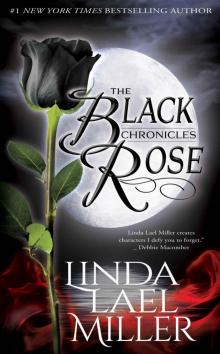 The Black Rose Chronicles
The Black Rose Chronicles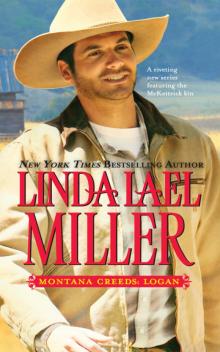 Montana Creeds: Logan
Montana Creeds: Logan My Darling Melissa
My Darling Melissa Skye
Skye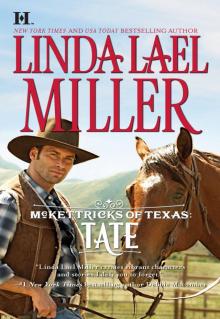 McKettricks of Texas: Tate
McKettricks of Texas: Tate Springwater Seasons
Springwater Seasons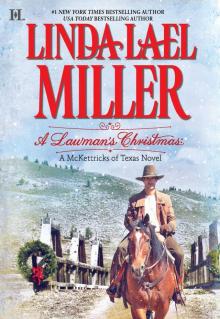 A Lawman's Christmas
A Lawman's Christmas Sierra's Homecoming
Sierra's Homecoming![Parable, Montana [4] Big Sky Summer Read online](http://i1.bookreadfree.com/i/03/22/parable_montana_4_big_sky_summer_preview.jpg) Parable, Montana [4] Big Sky Summer
Parable, Montana [4] Big Sky Summer One Last Weekend
One Last Weekend A Stone Creek Collection, Volume 2
A Stone Creek Collection, Volume 2 Tonight and Always
Tonight and Always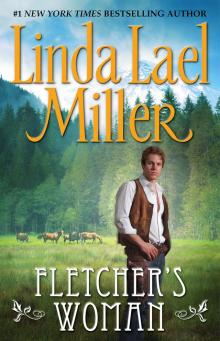 Fletcher's Woman
Fletcher's Woman A Snow Country Christmas
A Snow Country Christmas The Last Chance Cafe
The Last Chance Cafe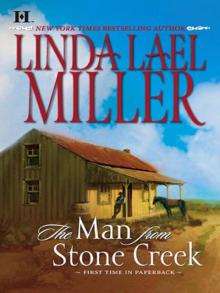 The Man from Stone Creek
The Man from Stone Creek Wanton Angel
Wanton Angel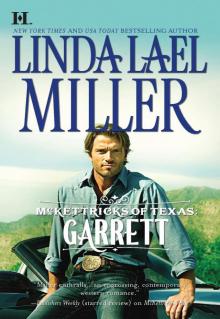 McKettricks of Texas: Garrett
McKettricks of Texas: Garrett Memory's Embrace
Memory's Embrace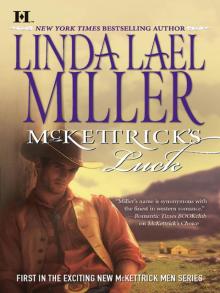 McKettrick's Luck
McKettrick's Luck Pirates
Pirates Big Sky River
Big Sky River Willow: A Novel (No Series)
Willow: A Novel (No Series) The McKettrick Legend: Sierra's HomecomingThe McKettrick Way (Hqn)
The McKettrick Legend: Sierra's HomecomingThe McKettrick Way (Hqn) Glory, Glory: Snowbound with the Bodyguard
Glory, Glory: Snowbound with the Bodyguard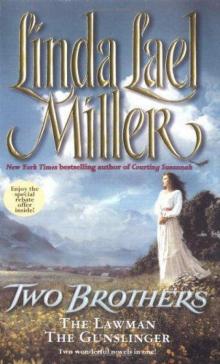 Two Brothers
Two Brothers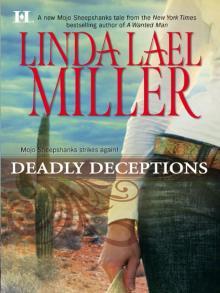 Deadly Deceptions
Deadly Deceptions Big Sky Secrets
Big Sky Secrets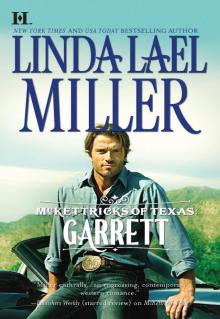 Garrett
Garrett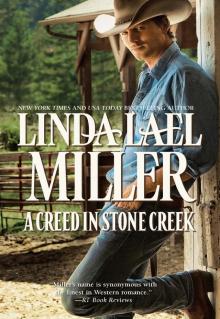 A Creed in Stone Creek
A Creed in Stone Creek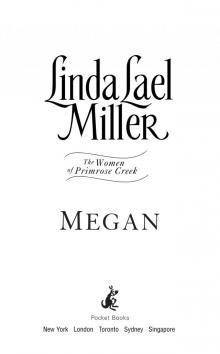 Megan
Megan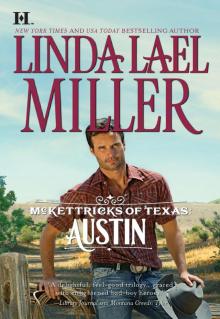 McKettricks of Texas: Austin
McKettricks of Texas: Austin Knights
Knights High Country Bride
High Country Bride More Than Words Volume 4
More Than Words Volume 4 Glory, Glory
Glory, Glory Daring Moves
Daring Moves Lily and the Major
Lily and the Major Courting Susannah
Courting Susannah Banner O'Brien
Banner O'Brien Big Sky Mountain
Big Sky Mountain Linda Lael Miller Bundle
Linda Lael Miller Bundle McKettrick's Pride
McKettrick's Pride A Stone Creek Collection Volume 1
A Stone Creek Collection Volume 1 A Wanted Man
A Wanted Man Big Sky Country
Big Sky Country The McKettrick Legend
The McKettrick Legend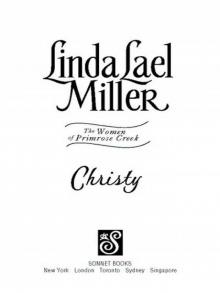 Christy
Christy McKettrick's Heart
McKettrick's Heart Resurrection
Resurrection Arizona Heat
Arizona Heat Secondhand Bride
Secondhand Bride Snowflakes on the Sea
Snowflakes on the Sea Montana Creeds: Tyler
Montana Creeds: Tyler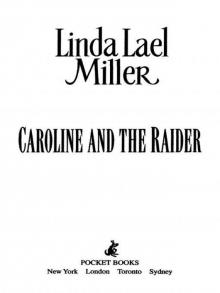 CAROLINE AND THE RAIDER
CAROLINE AND THE RAIDER A Proposal for Christmas: State SecretsThe Five Days of Christmas
A Proposal for Christmas: State SecretsThe Five Days of Christmas Yankee Wife
Yankee Wife Linda Lael Miller Montana Creeds Series Volume 1: Montana Creeds: LoganMontana Creeds: DylanMontana Creeds: Tyler
Linda Lael Miller Montana Creeds Series Volume 1: Montana Creeds: LoganMontana Creeds: DylanMontana Creeds: Tyler The Christmas Brides
The Christmas Brides McKettricks Bundle
McKettricks Bundle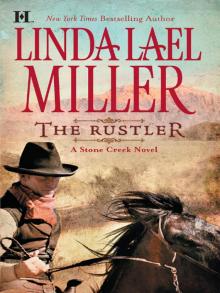 The Rustler
The Rustler Here and Then
Here and Then Only Forever
Only Forever Once a Rancher
Once a Rancher The 24 Days of Christmas
The 24 Days of Christmas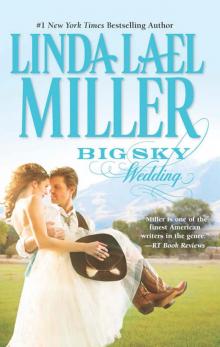 Big Sky Wedding
Big Sky Wedding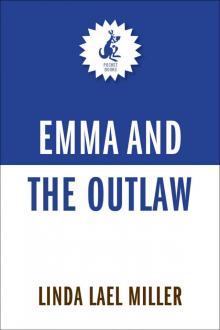 Emma and the Outlaw
Emma and the Outlaw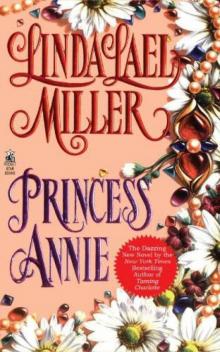 Princess Annie
Princess Annie Wild About Harry
Wild About Harry That Other Katherine
That Other Katherine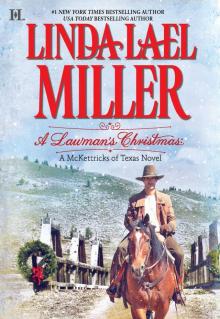 A Lawman's Christmas: A McKettricks of Texas Novel
A Lawman's Christmas: A McKettricks of Texas Novel Just Kate: His Only Wife (Bestselling Author Collection)
Just Kate: His Only Wife (Bestselling Author Collection)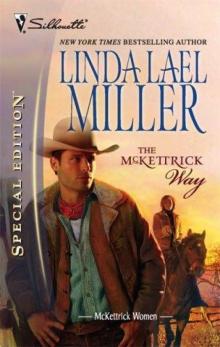 The McKettrick Way
The McKettrick Way Part of the Bargain
Part of the Bargain Taming Charlotte
Taming Charlotte Holiday in Stone Creek
Holiday in Stone Creek One Last Look
One Last Look Always a Cowboy
Always a Cowboy Batteries Not Required
Batteries Not Required A McKettrick Christmas
A McKettrick Christmas For All Eternity
For All Eternity The Marriage Season
The Marriage Season Corbin's Fancy
Corbin's Fancy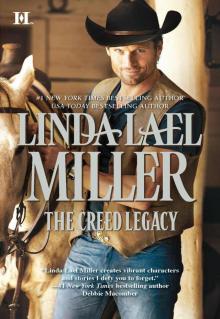 The Creed Legacy
The Creed Legacy Springwater Wedding
Springwater Wedding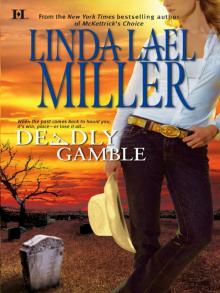 Deadly Gamble
Deadly Gamble Austin
Austin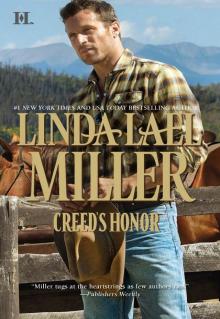 Creed's Honor
Creed's Honor A Creed Country Christmas
A Creed Country Christmas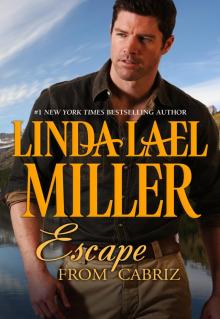 Escape from Cabriz
Escape from Cabriz There and Now
There and Now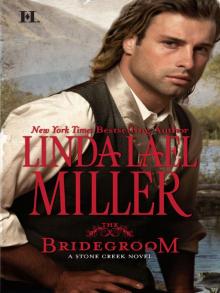 The Bridegroom
The Bridegroom State Secrets
State Secrets Bridget
Bridget